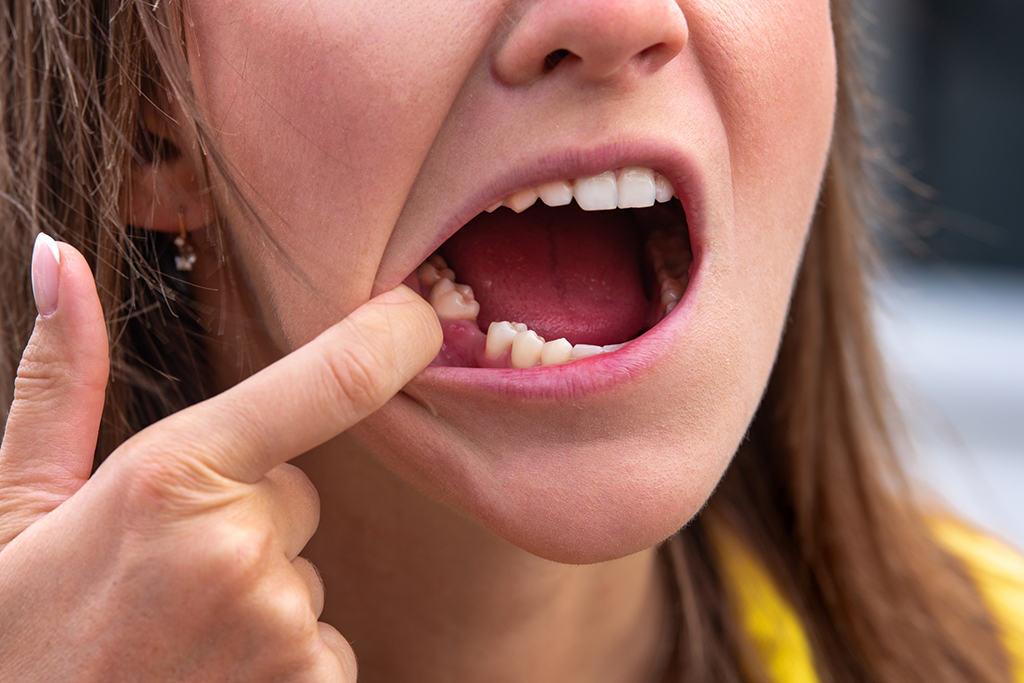
The Effects Of Missing Teeth: What You Need To Know From Your Oral Surgeon | McKinney, TX
Photo By Daria Kulkova at istock
By the time most adults reach the age of 44, they will have lost at least one of their permanent teeth. Unfortunately, a lost tooth isn’t only an esthetic problem for your smile. It is actually associated with various risks to both your oral and overall health. If you are missing a tooth, you should understand the risks. Fortunately, there are many options to remedy the situation, and your McKinney, TX, oral surgeon can help. Here, we’ll discuss the effects of missing teeth on your health and what you need to know.
Increased Risk for More Tooth Loss
If you have a missing tooth, you are actually at risk of losing more teeth. According to research, you are 30% more likely to experience subsequent tooth loss if you do not replace a missing tooth. Why? When you are missing a tooth, the other teeth are tasked to perform more work. Moreover, the gap in your smile can lead to problems with your bite and teeth instability.
Bone Loss
A missing tooth can trigger the loss of bone in your jaw. A dense jaw bone acts as an anchor for your teeth. When you lose a tooth, that particular spot of your mouth will no longer stimulate the jaw bone and associated muscle, weakening it. If the jaw weakens enough in that single spot, it can lead to problems for surrounding teeth, ultimately resulting in their loss too if not properly seen by your oral surgeon.
Gum Disease
The open pocket left behind by a missing tooth can heighten your risk for gum disease. Unfortunately, gum disease isn’t only a problem for your oral health. Gum disease is actually linked to conditions such as Alzheimer’s disease, diabetes, and even heart disease. When the tooth is lost, the area of the gums where it was becomes a gateway for bacteria. The bacteria causes gum inflammation, which can lead to further tooth loss, bone loss, and can even contribute to the development of the diseases just listed.
Crooked Teeth
If you have straight teeth and lose a tooth, don’t be surprised if your smile begins to look crooked. That’s because a missing tooth can make your other teeth more crooked. The remaining teeth, particularly those nearest to the missing tooth, can shift. In time, that shifting can lead to the development of crooked teeth.
Bite Issues
The shifting of your teeth will change your bite. Unfortunately, this can lead to an improper bite that causes habitual teeth grinding. It can even lead to a jaw disorder like TMJ. Bite problems can cause your teeth’ enamel to become damaged. Some people will experience increased teeth sensitivity because of a problematic bite. Others may suffer from tension headaches.
Reduced Confidence
A missing tooth that is visible when a person smiles can affect their self-esteem and confidence. It’s not uncommon for people to feel embarrassed about their smile once it has become affected by tooth loss. There are many fixes to deal with a missing tooth problem. If your smile is dampened because of tooth loss, your oral surgeon can help.
Tooth Replacement Options
Meeting your McKinney, TX, oral surgeon is important if you have lost a tooth. Your surgeon can recommend tooth replacement options. Today, there are more options than ever to replace missing teeth that include:
Dental Implants
Dental implants are a popular option for people experiencing tooth loss. Dental implants can be used to replace several teeth or just one. They act as an anchor for replacement teeth and are made from titanium, which is a material that is accepted by the human body. For most patients, a dental implant is an excellent tooth replacement option. However, some people may have health conditions that prevent them from being good candidates for dental implant surgery. These conditions can also impact the healing process after dental surgery.
Dental implants involve three major stages. First, your McKinney, TX, oral surgeon will place the titanium implant into your gums. Once in place, your gums need to heal. The area will feel tender and your dental provider may prescribe pain medications and recommend a soft food diet.
The next phase of dental implant is the waiting phase. This phase can actually take a couple of months depending on your healing process. The gums must completely heal in order to complete the process.
Finally, when your gums have healed, your oral surgeon can replace your missing tooth (or teeth) with a lab-created tooth. After the tooth has been crafted, your oral surgeon will fit it into the dental implant. While waiting for your prosthetic tooth, the surgeon may fit you with a temporary crown.
Bridge
A fixed bridge is another option for tooth loss. This is a good option when the teeth next to the gap are in good condition. Your dentist or oral surgeon will need to prepare these teeth before placing the bridge in the gap. Your bridge must be custom-made for you. Once the bridge is ready and your teeth have been repaired, your dental provider can cement the bridge in place.
Partial Dentures
Partial dentures are a convenient option for missing teeth. They can be removed and cleaned. When patients replace them, they will clasp them to adjoining teeth. The dentures are constructed with some type of clasp. People with dentures often take them out at night time as they should not be worn 24/7.
If you have a missing tooth, schedule an appointment with an oral surgeon at NextGen OMS. Learn more about the tooth replacement options that may be best for you. The sooner you repair your smile, the sooner you can prevent any issues related to missing teeth.


